Worst Day After Knee Replacement
What is the worst day after knee replacement?
I am a physical therapist who specializes in treating patients after a total knee replacement. In my experience, the worst day after knee replacement is the third day. I will explain why in this article and share some advice for making that third day less challenging.
Facebook Group Survey
In my Facebook group of more than 11K members I asked “What would you say was the worst day after knee replacement surgery?” You can see from the screenshot below that 52% of respondants chose day 3.
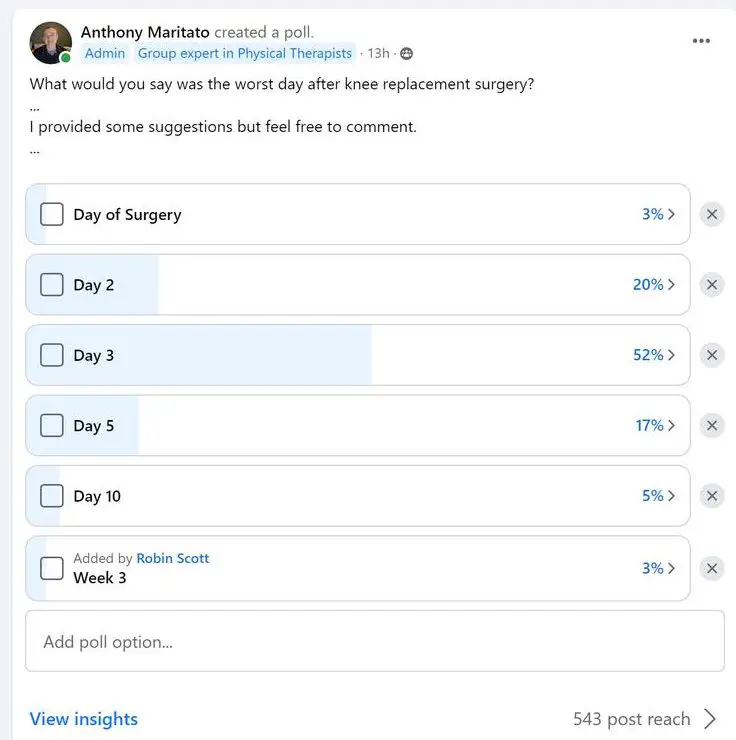
Introduction
If you’re scheduled for a knee replacement or have recently undergone the procedure, you’re likely asking yourself, “What will the recovery process look like? What will be the worst day after knee replacement?” It’s a pertinent question to understand what to expect and prepare for the hurdles ahead.
Recovery from a total knee replacement varies from person to person, but there’s a general consensus among patients and healthcare providers about the timeline of the healing process. It’s important to remember that each day can bring its unique challenges, with pain and discomfort being most intense usually around the third day post-surgery. This article will guide you through the different stages of recovery, helping you navigate the tough times and progress towards regaining your mobility.
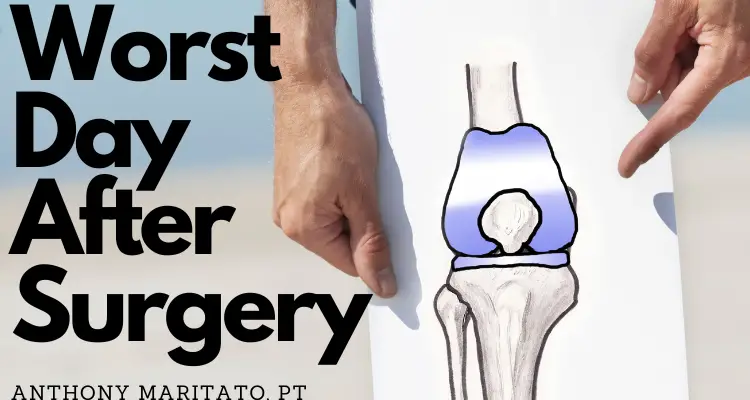
Day 1: The Day of Surgery
The first day of your knee replacement journey is filled with mixed emotions – anxiety, anticipation, and hope. The day of the surgery is primarily about the procedure and initiating recovery. Interestingly, many patients report this day as fairly comfortable, thanks largely to anesthesia and pain-blocking medications.
Immediately post-surgery, you may feel groggy or sleepy due to the residual effects of anesthesia. You will be monitored closely by healthcare professionals who ensure your vitals are stable and you are recovering well from anesthesia. You’ll likely be resting in bed for the remainder of the day, taking your first steps towards healing.
It’s important to note the following points for Day 1:
- Rest: You will likely spend most of this day in bed, resting and recuperating from the surgery.
- Pain management: Though anesthesia and pain medication help, you may still experience some discomfort or pressure in the surgical area.
- Hydration and nourishment: You might be allowed liquids and light meals, depending on your doctor’s advice.
- Physical therapy: You might begin light exercises or movements with the help of a physical therapist.
On this day, you might not feel the full brunt of the surgical impact due to the analgesics and anesthetics in your system. Nonetheless, it’s essential to follow your medical team’s instructions, focusing on resting and initiating the healing process.
As the day progresses, you might feel worn out. However, the physical exhaustion will be tempered by the knowledge that you’ve taken a crucial step towards improved mobility and pain-free living. Remember, this is just the first day in your journey of recovery. The real test begins once the anesthesia fully wears off and the reality of recovery sets in.
Day 2: Post-Surgery Trauma Sets In
The second day after knee replacement surgery is when the reality of the procedure begins to settle in. The residual anesthesia starts to leave your system, and the surgical trauma makes its presence felt more keenly.
One might start feeling the effects of surgery more on the second day, including discomfort in the surgical area. You may feel fatigued and have a lack of appetite. It is important to drink fluids to prevent dehydration, which can cause additional discomfort and slow down the healing process. Pain medication continues to be administered as per your doctor’s directions.
Let’s break down what to expect on day two post-surgery in the table below:
| Aspect | What to Expect |
|---|---|
| Pain | Increased sensation of pain as anesthesia wears off. |
| Physical Activity | Continued assistance with physical therapy, focusing on light exercises and movements. |
| Diet | Possibly a lack of appetite. Importance of staying hydrated and consuming light, nutritious meals. |
| Mood | Can experience frustration or anxiety as the impact of surgery sets in. |
The second day is challenging, but remember that it’s a normal part of the recovery process. It’s crucial to communicate any unexpected symptoms or significant changes to your healthcare team, who can help guide you through this difficult phase.
Taking care of your body, following

Day 3: The Worst Day After Knee Replacement
The third day post-knee replacement surgery is often regarded as the worst day of the recovery journey. As the anesthesia has completely worn off by this point, you become fully alert and conscious of the post-surgical pain and discomfort.
Pain Management
The pain usually peaks around this time due to swelling and stiffness around the surgical area. Some patients might struggle with managing their prescribed pain medication, or the medication might not work as effectively as expected. Consequently, the pain levels can seem overwhelming, which is why this day is generally considered the most difficult in the recovery process.
Mobility and Physical Therapy
Day three also signifies a significant turning point in your physical therapy regimen. Therapists might introduce new exercises aimed at increasing your knee’s flexibility and strength. Despite the discomfort, it’s important to push through these exercises as they’re critical to your long-term recovery and mobility.
Emotional Well-being
While dealing with physical pain, it’s also common for patients to experience a low point emotionally on this day. The realization of the recovery journey ahead can seem daunting, which is why maintaining a positive mindset is crucial.
Here are a few tips to help navigate Day 3:
- Pain Management: Take your pain medication as prescribed. Don’t hesitate to communicate with your healthcare provider if the pain seems unmanageable.
- Physical Therapy: Despite the discomfort, try to participate actively in your physical therapy sessions.
- Stay Hydrated and Nourished: Maintain your fluid intake and continue eating nutritious meals to support your body’s healing process.
- Positive Mindset: Remember that this difficult phase is temporary and integral to your recovery. Reach out to your support system or use mindfulness techniques to maintain your mental well-being.
Despite the challenges that Day 3 brings, remember that each step you take is a step closer to recovery. Pain is a part of the healing process, and managing it effectively on this day will prepare you better for the rest of your recovery journey.
Day 5: Adjusting to New Routines
By day five of your recovery from knee replacement surgery, you are likely to have established a routine. The intense pain experienced on day three should start to reduce, and you’ll have a better understanding of how to manage it effectively. This day is often a turning point, where patients start feeling more confident in their ability to navigate the recovery process.
You would have gained more insights about your condition from interactions with the physical therapy team and the surgical team. They’ll have addressed your concerns, helping to clear any confusion or fear you might have had about your recovery.
Mobility Improvements
Around this time, you’ll start noticing improvements in your mobility. The physical therapy sessions would begin to pay off, and you might be able to stand and walk more freely compared to the previous days. In some cases, you might start transitioning from a walker to using a cane, a significant milestone on your recovery journey.
Managing Pain and Discomfort
Pain management continues to be a crucial part of recovery. While the levels of pain might have lessened compared to the third day, some discomfort will persist. Continue taking your prescribed medication, ensuring you’re comfortable enough to participate in physical therapy.
Continued Care and Rest
Even though you’re making progress, it’s essential to continue taking care of your body. Resting adequately, maintaining a healthy diet, and staying hydrated are key elements that would aid in your recovery.
Day five of the recovery journey after knee replacement surgery marks a shift towards adjusting to the new routines. It’s a day of optimism, where you’re likely to see tangible improvements in your mobility and are better equipped to manage your pain. Always remember that everyone’s recovery journey is unique, and it’s crucial to listen to your body and take things at your own pace.
Day 10: Gradual Progress
Reaching the tenth day after knee replacement surgery is a significant milestone in your recovery journey. By now, you will have settled into a routine, and you should be seeing gradual, but steady, progress in your mobility and overall comfort levels.
Improvements in Mobility
Ten days into recovery, you should be able to move around with increased ease. You might still be using a cane, but there should be a noticeable improvement in your walking capability. Each step taken is an accomplishment, a testament to your determination and the hard work put into your physical therapy sessions.
Reduced Pain Levels
Pain levels should have reduced significantly by now compared to the initial days. It’s crucial to continue with your prescribed pain management plan to ensure comfort and ease during physical therapy sessions and everyday movements.
Physical Therapy and Exercise
Your physical therapy routine will likely be more demanding, focusing on strength building and enhancing flexibility. Remember, these exercises are key to achieving a full range of motion in your new knee and ensuring a successful recovery in the long run.
Emotional Well-being
By day ten, you should feel more emotionally adjusted to your recovery process. The progress you’ve made will likely boost your morale. However, it’s essential to continue practicing self-care and maintain a positive mindset to navigate any challenges that come your way.
Day 10 after knee replacement surgery is characterized by gradual but steady progress. This period signifies a crucial phase in your recovery journey, where your efforts in managing pain and participating in physical therapy start yielding tangible improvements. Despite the challenges, always remember that each day is a step closer to complete recovery and improved quality of life.
Day 28 and Beyond: The Road to Full Recovery
Four weeks into your recovery from knee replacement surgery, you’ve reached a substantial milestone. This phase is all about consolidating your gains and looking ahead to the journey that still lies in front of you. It’s important to remember that each person’s recovery is unique, and progress rates can vary.
Increased Independence
By now, you should notice a considerable increase in your independence. You might be able to walk without a cane or with only occasional use. There should be significant improvement in your overall mobility, potentially resuming some of your regular activities, albeit carefully and under guidance.
Continued Physical Therapy
Your physical therapy will likely continue, now focusing on improving strength and balance and maximizing the function of your new knee. These exercises are essential for a full recovery and should be done consistently.
Pain Management
While the most severe pain should be behind you, mild discomfort and occasional pain may persist, especially after physical therapy sessions. Continue your pain management plan as advised by your healthcare provider.
Mental Health
As you regain your mobility and independence, your emotional well-being should also improve. Continue to engage in practices that help maintain a positive mindset. Connect with your support group, share your experiences, and never hesitate to seek help if you’re feeling down.
The journey to full recovery after knee replacement surgery is a marathon, not a sprint. By day 28 and beyond, you should be well on your way to regaining your lifestyle. Remember to be patient with yourself and take one day at a time. Progress may seem slow at times, but with continued care and commitment, you’ll soon enjoy the benefits of your new knee.
Article Summary and Key Takeaways
This article provided a comprehensive overview of the recovery journey following a knee replacement surgery, focusing on the worst day after the procedure, typically the third day, and key milestones thereafter.
Below are the primary takeaways from each phase of the recovery process:
- Day 1: The day of surgery is typically characterized by fatigue due to anesthesia, but pain is usually well-managed with medication.
- Day 2: The trauma of the surgery sets in as the anesthesia wears off, leading to increased discomfort. Hydration and adequate rest are crucial during this stage.
- Day 3: Often the worst day after knee replacement, pain levels and swelling usually peak on this day. Pain management and physical therapy play vital roles in navigating this challenging phase.
- Day 5: A routine starts to develop, and the patient begins to feel more confident as they engage more with physical therapy and adjust to their new physical condition.
- Day 10: Notable progress should be observed in mobility and comfort levels by this stage. Persistence with physical therapy and continued pain management are essential.
- Day 28 and Beyond: This phase marks a significant milestone in recovery. Increased independence and continued physical therapy are critical, while mild discomfort may persist.
The journey to full recovery after knee replacement surgery is unique for each individual, with progress rates varying. It’s important to be patient with yourself, take one day at a time, and stay committed to your recovery regimen for the best possible outcomes.

Anthony Maritato, PT
Physical Therapist
Anthony Maritato, PT has been a licensed physical therapist and private practice owner since 2006. Ohio license #PT011602.
Anthony has been passionate about helping patients recover from total knee replacement surgery as well as rotator cuff repair surgery.
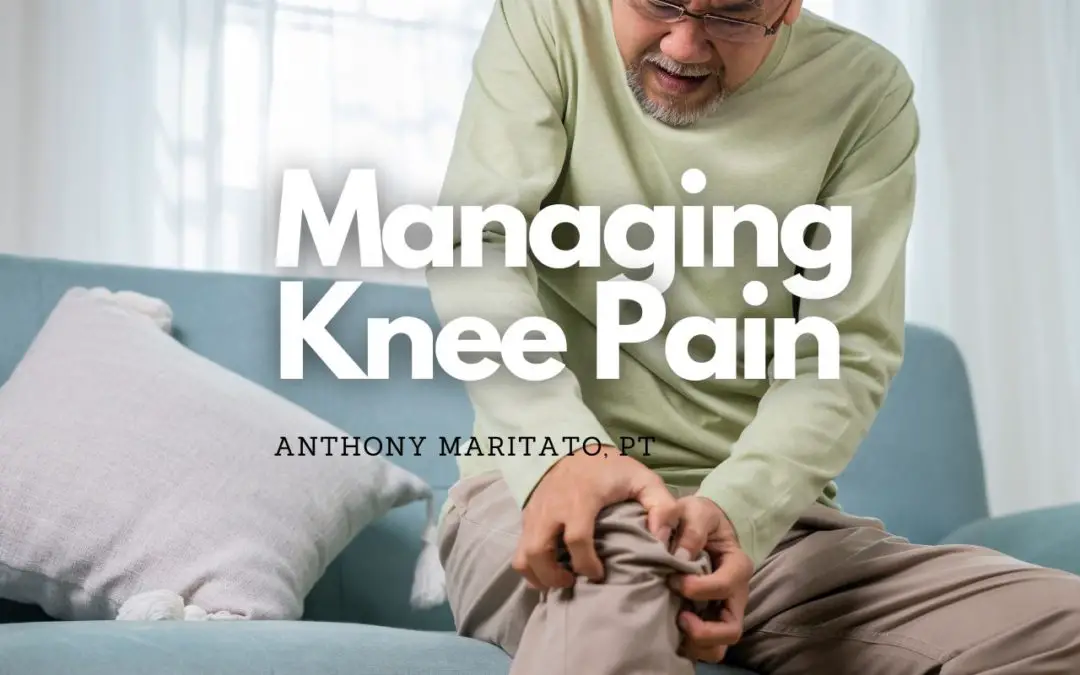
Managing Pain After Total Knee Replacement
Introduction to Managing Pain After a Knee Replacement Undergoing a total knee replacement is a significant medical procedure that can dramatically improve your quality of life. However, the journey to full recovery involves navigating through various challenges, one...

Total Knee Replacement Pain at Night
What to Expect Explore our comprehensive guide on managing 'Total Knee Replacement Pain at Night.' Learn about the causes of night pain, effective pain management strategies, best sleeping positions, and more. This article provides practical advice to help individuals...
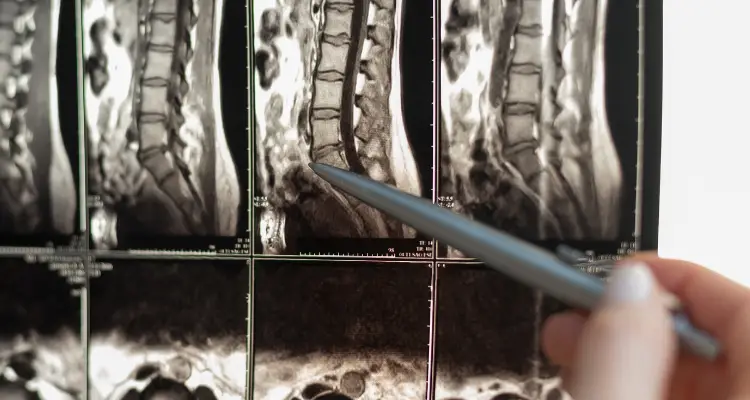
Overview of Spinal Stenosis
Table of Contents What is spinal stenosis What are the symptoms of spinal stenosis How is spinal stenosis diagnosed What are the different types of treatment for spinal stenosis Where to find more information 1. What is spinal stenosis Spinal stenosis is a condition...

Spinal Stenosis Exercises to Avoid: During Knee Replacement Recovery
Spinal stenosis is relatively common among adults having a total knee replacement surgery. While spinal stenosis doesn't always impact total knee replacement recovery, when it does, it can be frustrating. Before I specialized in treating patients after a total knee...

Ride a Peloton After Knee Replacement Surgery
Table of Contents When can I return to riding my Peloton bike at home after a total knee replacement? Is a Peloton bike good physical therapy after a total knee replacement surgery? Will riding my Peloton too much wear out my new knee? How often should I ride my...
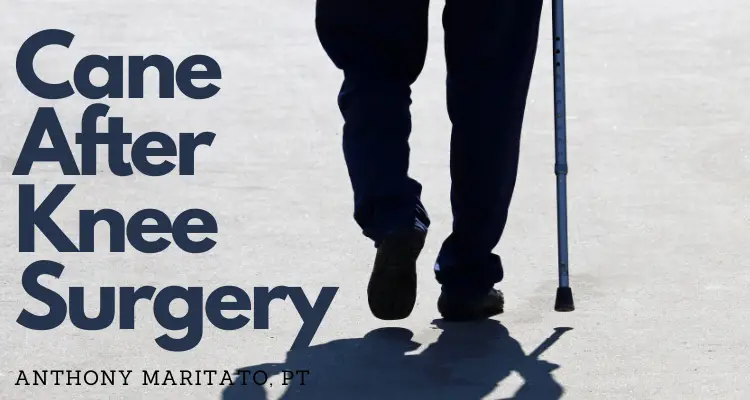
How to Use a Cane After Knee Surgery
Table of Contents Understanding the Purpose of Using a Cane after Knee Surgery How to Properly Use a Cane after Knee Surgery Common Mistakes to Avoid When Using a Cane Transitioning from a Walker to a Cane: When and How? Understanding the Purpose of Using a Cane after...
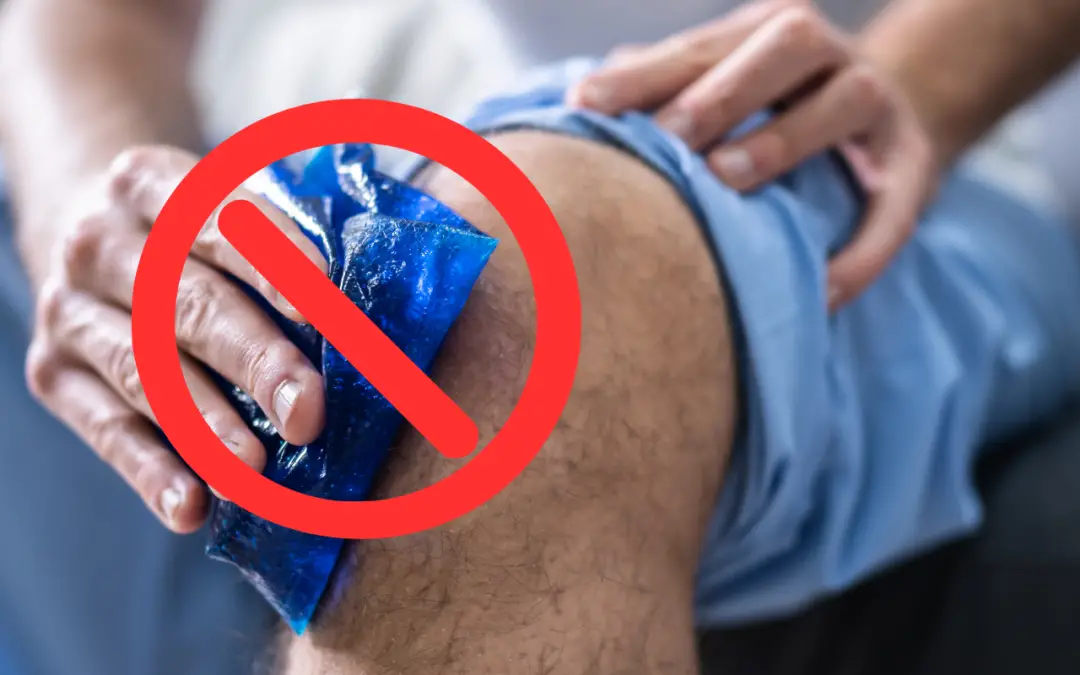
Ice Machine for Knee Surgery
Table of Contents Benefits of Using an Ice Machine After Knee Surgery How an Ice Machine Works Top Ice Machines for Knee Surgery Recovery How to Use an Ice Machine After Knee Surgery Where to Buy an Ice Machine and What to Consider Benefits of Using an Ice Machine...

Walking Your Dog After Knee Replacement Surgery: A Timeline for Recovery
Table of Contents Introduction Walking Your Dog After Knee Replacement Safety Considerations and Precautions Conclusion Introduction Hello, fellow dog lovers and knee replacement warriors! I'm Anthony Maritato, a licensed physical therapist specializing in post-total...

Top 5 Mistakes After Knee Replacement
In this article I will share my experience as a physical therapist and personal trainer of more than 22 years treating patients after total knee replacement surgery. I have seen patients who made every mistake possible and still had a great outcome following this...

Disadvantages of Knee Replacement Surgery
Table of Contents Introduction Pain Time Lost Cost Stress Post Surgical Risk or Complications Conclusion Introduction When considering treatment options for severe knee arthritis, one commonly considered intervention is knee replacement surgery. Despite its high...
